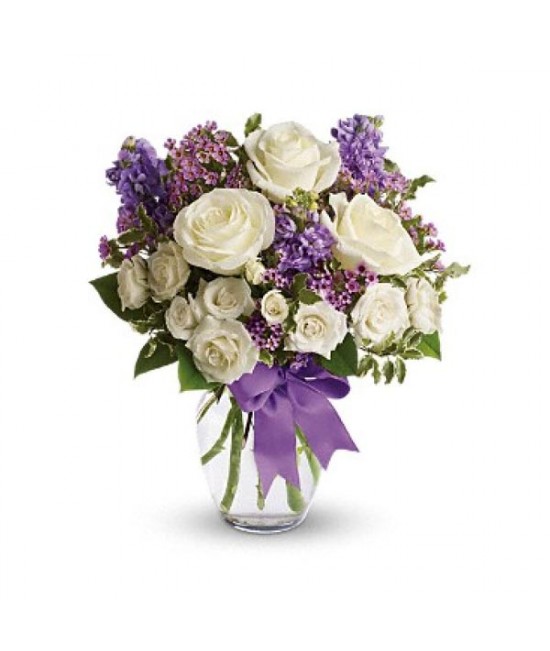
WeddingWire, a company in Chicago Florist that makes technology for the wedding industry, says that 33% of engagements happen between Thanksgiving and Christmas.
Families are together, there are lights everywhere,
and everyone is excited to open gifts. This makes a lot of excited brides stop by to talk about wedding flowers. One of the most popular wedding flowers is the Madagascar Jasmine, also called the stephanotis. This small flower in the shape of a star is pretty to look at and smells very good. Stephanotis flowers are sometimes called Madagascar jasmine flowers because they have a strong scent and small, white flowers that look like jasmine. The common jasmine is in the olive family, so its flowers are not related to each other. In the language of flowers, the flowers mean happiness in a marriage, and stephanotis flowers smell great and take up little space in wedding bouquets. Think about this sweet little classic when putting together the perfect bouquet.
The other night, while Chicago Florist and I were watching TV at home, we saw a story on
“Miracle on 34th Street,” a classic Christmas movie, came on by accident when we were switching stations. I told him how much I liked the movie and how it had changed the way I think about retail customer service since I bought my florist shop when I was 19 and in college. Lessons from this movie are more important than ever. It looks like I’m not the only one who thinks outside the box.
Anna Papachristos of 1 to 1 Media wrote an editorial that you can read below to see what I mean.
The customer service guide for “Miracle on 34th Street”
Santa sees you when you’re sleeping and knows when you’re awake, but the typical Christmas song doesn’t talk about how smart he is with money. A quick look at what Saint Nicholas does in Miracle on 34th Street shows that behind his white beard is a customer service pro with a lot of experience.
Santa sees you when you’re sleeping and knows when you’re awake, but the typical Christmas song doesn’t talk about how smart he is with money. A quick look at what Saint Nicholas does in Miracle on 34th Street shows that behind his white beard is a customer service pro with a lot of experience.
Mr. Kringle’s plan was theoretically groundbreaking,
and Mr. Macy and other national department store competitors liked it. Mr. Macy saw that making his business “the helpful store, the kind store, the store with a heart” was a good idea. He did what Mr. Kringle did and treated these customers as people, not as ways to make money.
In today’s always-connected, many-channel world, businesses are often too busy coming up with a plan to pay attention to their customers.
Even though these businesses try to give the best customer service possible,
They don’t care about the customer as a person. They say that their method will make customers happier or keep them coming back, but their fixation on data hurts businesses. This information is useless if they don’t understand who is to blame for these results.
Even though “Miracle on 34th Street” is just a story,
The lessons it teaches are still true. Even though technology has changed a lot in the 65 years since this famous classic came out, we can’t ignore how elegantly simple their service initiative is. They didn’t need to use social media or apps on their phones. To increase customer loyalty and word-of-mouth, they just need someone to show them how to treat customers like people, not like chess pieces. If we work hard to simplify technology, we might be able to re-energize the most important part of any business: the customer.
Brand loyalty that companies like FTD and the BBB have built up over the years will be hard to get rid of.
People need to know, though, that FTD is no longer the trustworthy company it used to be. In the last 20 years, it has changed hands many times, and now it is a nightmare of greed and lies. People should be just as careful when buying flowers online from a relay company as they are when buying anything else from an unknown source. Use a business in your town that you know, and shop locally. The Better Business Bureau is no longer a neutral watchdog for businesses. How could the company be fair if ratings can be bought and sold? Buyer Beware!
This is a copy of a piece that the author wrote.
Cathy Hillen Rulloda,
Avante Gardens Florist in Anaheim Calif.
As a business owner whose company is a BBB member, I find it upsetting that the Chicago BBB published a misleading headline about florists on Valentine’s Day.
“Chicago Florists Do Well in 2011: Only 30 Customer Complaints” would have been a better title.How about a do-over, BBB of Chicago? And if you send out a press release warning people not to buy flowers for Valentine’s Day, think twice before giving A+ ratings.
Valentine’s Day BBB Florist Warning: Most Common Source of Complaints
There are many tips on how to buy flowers for Valentine’s Day. Yesterday, the Better Business Bureau of Chicago said that the number of complaints against florists went up by 47% from 2010 to 2011. They told sweethearts to be careful and only buy the best flowers.
A 47 percent rise in complaints? Quite a scary number that needed to be looked at carefully.
So I looked through their statistics to find out why the number of BBB complaints went up all of a sudden:
In 2011, there were 588 complaints about Chicago Florist, but only 558 complaints about florists
I called the Chicago office of the Better Business Bureau to ask a few questions and let them know that I didn’t like how their news release made all Chicago florists look bad. In fact, all but 5 percent of the complaints were about a single Chicago Florist, but the BBB still gave it an A+ rating.
By telling people to look at florist reviews on the BBB website, the BBB is, in effect, “endorsing” the single biggest reason people are unhappy with their floral purchases.
Many local florists say that the Better Business Bureau should include major floral marketing companies like FTD, Teleflora, 1800Flowers.com, Blooms Today, Just Flowers, and others separately from local flower shops. These businesses don’t keep fresh flowers on hand and don’t make their own deliveries. They often send orders to local florists or use third-party fulfillment companies to drop-ship orders through parcel services.
Please don’t call them Chicago Florist. Instead, call them Floral Relay Services, Floral Marketing Agencies, Online Floral Services, or any other name that accurately describes what they do. Putting small retailers in the same category as national contact centers or affiliate marketers is like putting Expedia or Travelocity, which are travel agencies, in the same category as hotels or Chicago Florist
Before anyone thinks that complaints are mostly about bad local florists, it might be helpful to know:
On Valentine’s Day 2011, there was a big marketing mess between Groupon. discount offers through the group buying site were called “bait-and-switch” schemes by the national media.
About 75% of the Valentine’s Day and other floral holiday items shown are not delivered by local flower shops. They are shipped in boxes with UPS and FedEx.
During the holidays, when everyone is busy, the cons of taking such orders now outweigh the pros. Before and on busy days like Mother’s Day and Valentine’s Day, many stores turn off their FTD communications software and refuse to take FTD orders. more





